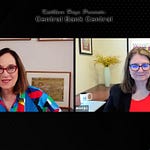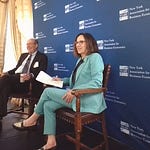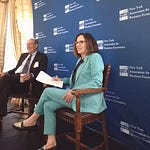The sun is starting to set. A pre-dinner reception is underway on the patio outside Stanford’s Hoover Tower. It’s the end of a long day of panels and speeches at the 50th anniversary of the Shadow Open Market Committee where the attendees are discussing all aspects of monetary policy, where it was, where it is now and where it could and should be next.
Sitting down next to me is Charles I. Plosser, former president of the Federal Reserve Bank of Philadelphia. Charlie, as everyone calls him, is a respected academic who was co-editor of the Journal of Monetary Economics for twenty years. Importantly especially at this event, he is esteemed co-founders of the SOMC which is celebrating its 50th Anniversary.
I’m not sure how long twilight is going to last so I jump right in and ask him if the research the SOMC has done over the years on monetary policy has borne fruit. I ask what he sees as the most important issues that need to be addressed?
Is the SOMC relevant amid 21st century turmoil and challenges
”I think that the shadow remains relevant, has been particularly relevant in the 21st century….With all the turmoil and challenges to policy making. And I think that's been its real value…in the 21st century with all the turmoil and challenges to policy-making.
Fed doing things beyond scope of traditional monetary policy
They're doing credit policy, they're lending to institutions, they're doing a lot of things that are beyond the traditional scope of monetary policy. The way they've managed the balance sheet, the important role that the Fed has engaged in lending practices, bailouts, credit policies, special facilities…all that has really changed the face of the Fed in many ways.
Fed shifting in dangerous ways to financial system
While some of the policies were probably good, some of them were not so good. It's changing the shape of the Fed in ways that I think are potentially dangerous.
Kathleen: In what way?
Now they're changing the institution. The Fed used to be primarily concerned with the price of gold. That was what central banks did. Now it’s all about the financial system.
Real issue is Fed independence
I think that the real issue is independence that the Fed…set up and worked very hard to achieve: independence from the fiscal authority. And as a result Milton Friedman used to tell that you need to focus on price stability but that seems to have failed.
Sit back and hear, see what Charlie sees behind us and ahead of us. As we raced to finish before sundown he got a lot of big views into a short period of time.
Charles I. Plosser served as president and CEO of the Federal Reserve Bank of Philadelphia from 2006 to his recent retirement in 2015. He is currently a Visiting Fellow at the Hoover Institution at Stanford University and serves as a director on several boards. Prior to joining the Federal Reserve Bank of Philadelphia, Plosser was the John M. Olin Distinguished Professor of Economics and Public Policy and director of the Bradley Policy Research Center at the William E. Simon Graduate School of Business Administration at the University of Rochester, where he also served as dean from 1993 to 2003. His research interests include macroeconomics, monetary theory and policy, econometrics, and finance. He has published articles in the major economic journals and served as co-editor with Robert King of the Journal of Monetary Economics for 20 years. Plosser has been a Visiting Scholar at the Bank of England and the Federal Reserve Bank of Minneapolis. He also has served a as Research Associate at the National Bureau of Economic Research in Cambridge, Massachusetts. In the last decade, Plosser has given over one hundred talks around the world to audiences comprised of academics, the business community and the general public on topics ranging from economics and public policy to management education and forecasting. He earned a BE degree from Vanderbilt University in 1970 and an MBA and PhD in economics from the University of Chicago in 1972 and 1976, respectively.













Share this post